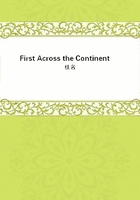
第98章
Crossing the Bitter Root Mountains Disasters many kept pace with the unhappy explorers on their way back to Quamash flats after their rebuff at the base of the Bitter Root Mountains. One of the horses fell down a rough and rocky place, carrying his rider with him; but fortunately neither horse nor man was killed. Next, a man, sent ahead to cut down the brush that blocked the path, cut himself badly on the inside of his thigh and bled copiously.
The hunters sent out for game returned empty-handed. The fishermen caught no fish, but broke the two Indian gigs, or contrivances for catching fish, with which they had been provided.
The stock of salt had given out, the bulk of their supply having been left on the mountain. Several large mushrooms were brought in by Cruzatte, but these were eaten without pepper, salt, or any kind of grease,--"a very tasteless, insipid food," as the journal says.
To crown all, the mosquitoes were pestilential in their numbers and venom.
Nevertheless, the leaders of the expedition were determined to press on and pass the Bitter Root Mountains as soon as a slight rest at Quamash flats should be had. If they should tarry until the snows melted from the trail, they would be too late to reach the United States that winter and would be compelled to pass the next winter at some camp high up on the Missouri, as they had passed one winter at Fort Mandan, on their way out.
This is the course of argument which Captain Lewis and Clark took to persuade each other as to the best way out of their difficulties:--"The snows have formed a hard, coarse bed without crust, on which the horses walk safely without slipping; the chief difficulty, therefore, is to find the road. In this we may be assisted by the circumstance that, though generally ten feet in depth, the snow has been thrown off by the thick and spreading branches of the trees, and from round the trunk; while the warmth of the trunk itself, acquired by the reflection of the sun, or communicated by natural heat of the earth, which is never frozen under these masses, has dissolved the snow so much that immediately at the roots its depth is not more than one or two feet. We therefore hope that the marks of the baggage rubbing against the trees may still be perceived; and we have decided, in case the guide cannot be procured, that one of us will take three or four of our most expert woodsmen, several of our best horses, and an ample supply of provisions, go on two days' journey in advance, and endeavor to trace the route by the marks of the Indian baggage on the trees, which we would then mark more distinctly with a tomahawk.
When they should have reached two days' journey beyond Hungry Creek, two of the men were to be sent back to apprise the rest of their success, and if necessary to cause them to delay there; lest, by advancing too soon, they should be forced to halt where no food could be obtained for the horses.
If the traces of the baggage be too indistinct, the whole party is to return to Hungry Creek, and we will then attempt the passage by ascending the main southwest branch of Lewis' River through the country of the Shoshonees, over to Madison or Gallatin River. On that route, the Chopunnish inform us, there is a passage not obstructed by snow at this period of the year."
On their return to Quamash flats the party met two Indians who, after some parley, agreed to pilot them over the mountains; these camped where they were, and the party went on to the flats, having exacted a promise from the Indians that they would wait there two nights for the white men to come along.
When the party reached their old camp, they found that one of their hunters had killed a deer, which was a welcome addition to their otherwise scanty supper. Next day, the hunters met with astonishing luck, bringing into camp eight deer and three bears.
Four of the men were directed to go to the camp of the two Indians, and if these were bent on going on, to accompany them and so mark, or blaze, the trees that the rest of the party would have no difficulty in finding the way, later on.
Meanwhile, the men who had been sent back for guides returned, bringing with them the pleasing information that three Indians whom they brought with them had consented to guide the party to the great falls of the Missouri, for the pay of two guns.
Accordingly, once more (June 26), they set out for the mountains, travelling for the third time in twelve days the route between Quamash flats and the Bitter Root range.
For the second time they ran up against a barrier of snow.
They measured the depth of the snow at the place where they had left their luggage at their previous repulse and found it to be ten feet and ten inches deep; and it had sunk four feet since they had been turned back at this point.
Pressing on, after they reached their old camp, they found a bare spot on the side of the mountain where there was a little grass for their horses; and there they camped for the night.